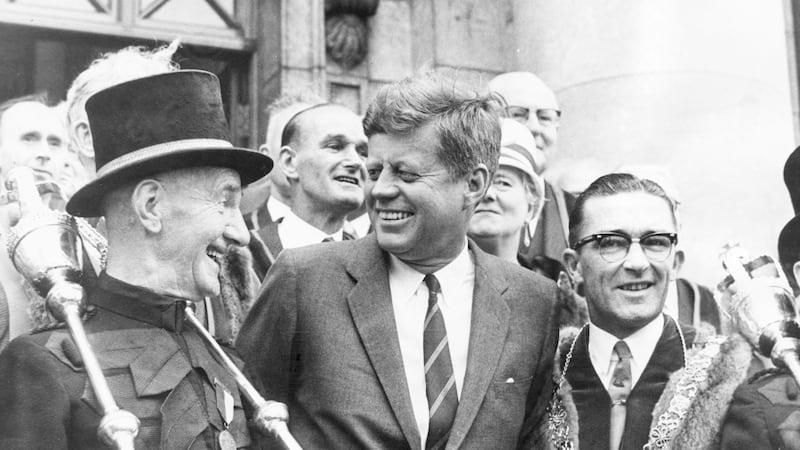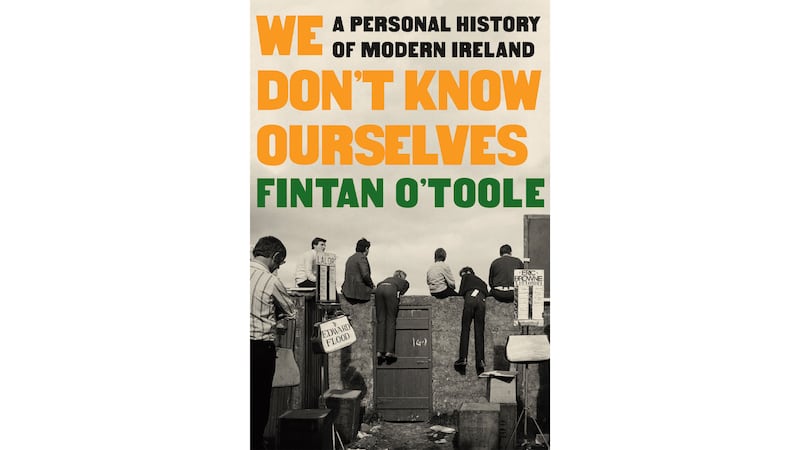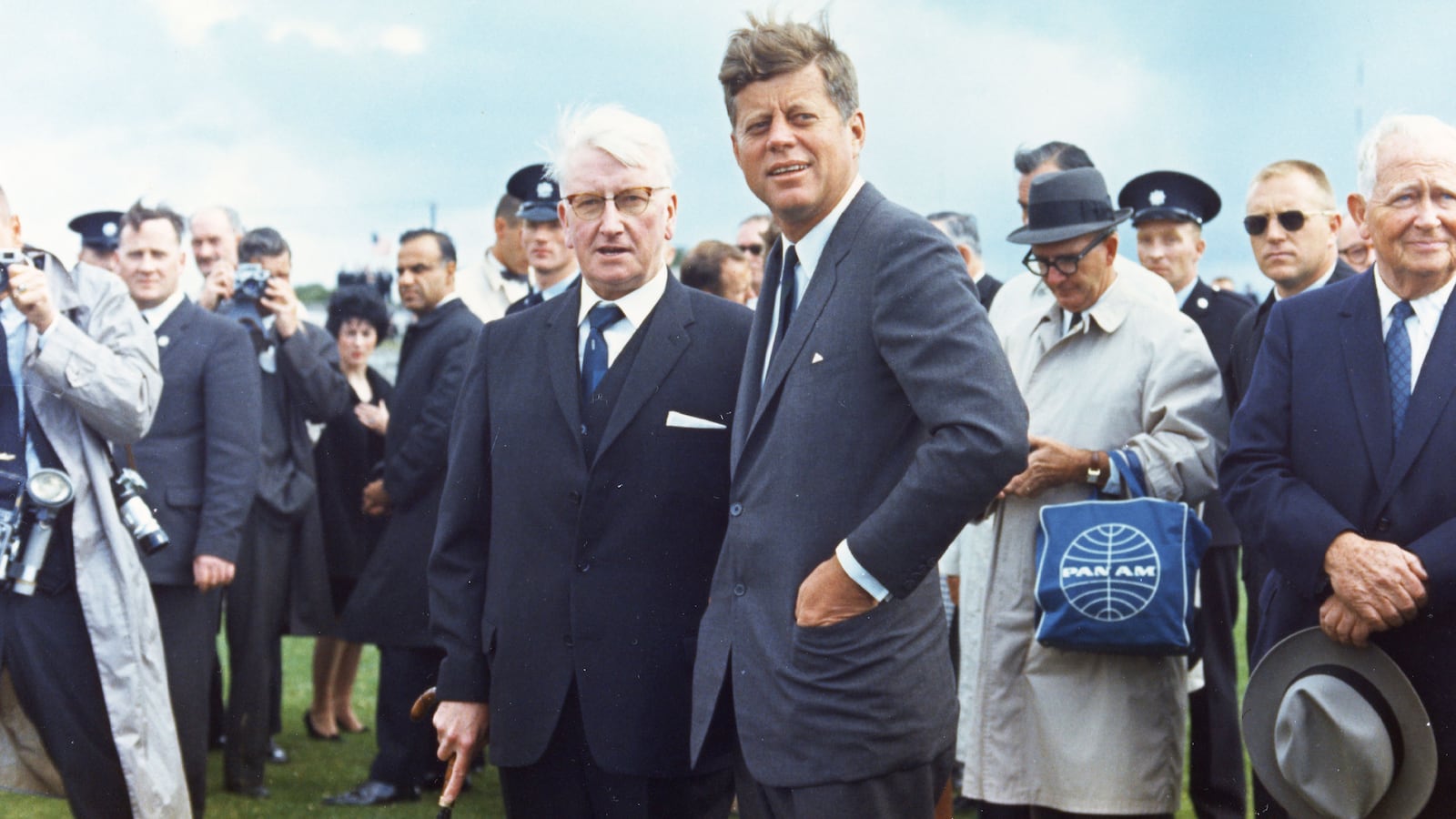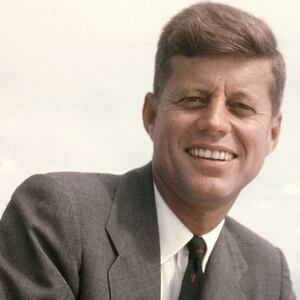When John F. Kennedy arrived at Dublin Airport on the evening of 26 June 1963, he conjured up an image of a broken and scattered family being reunited. He stood on the tarmac, tanned and gleaming, and told us that “No country in the world, in the history of the world, has endured the hemorrhage which this island endured over a period of a few years, for so many of its sons and daughters. These sons and daughters are scattered throughout the world, and they give this small island a family of millions upon millions who are all over the globe.” In his words, in his presence, was the tacit promise that all of these sons and daughters and in-laws would be brought together again at the buffet table of the post-war world. But we still feared that when we arrived for the feast, we would be confronted by a sour old man muttering, “Just who are these freeloaders?” and demanding our names.
At the time, the Observer described the four days of Kennedy’s state visit in June 1963 as Ireland’s “first wholly satisfactory act of nationhood” and this was not wrong. But in retrospect, the ambivalence of that moment of arrival is striking. Even the image of family that was trotted out with such apparent comfort is disturbingly paradoxical. Eamon de Valera, President of Ireland, went to greet Kennedy at the airport, and it was as if, here as well as in Washington, the torch was being passed to a new generation. In de Valera’s eyes, the young man who had come down from the sky was a fulfilment of a millennium of Irish historical oppression. Bizarrely, he evoked an image of JFK as an ancestral avenger, summoned from the deep past to smash the foreigner.
He hailed him as a representative of “the great Kennedy clans of the Dal gChais, who under the mighty King Brian nine-and-a- half centuries ago, not far from the spot on which we are standing, smashed the invader and broke the Norse power forever.”
In this squaring of the circle, the idea of foreignness itself melted away. An Irish president born in Brooklyn came to do homage to an American president “from” New Ross. And to this strange symmetry was added the aura of a ritual succession of kingship, for these two men could have been father and son, and we were swapping the monkish, puritanical image of Ireland which de Valera embodied for the smooth, sexy, urbane Kennedy. The disturbing question, though, was who was the father and who the son? President de Valera addressed President Kennedy now as a proud father, now as a humble and grateful child. In his address of welcome, he spoke to Kennedy like a beaming daddy who has called his boy into the study to congratulate him on his exam results. He called him “a distinguished son of our race” and told him frankly, “We are proud of you, Mr. President.”
Yet, at other times, he spoke like an awed child, or like the chief of a remote tribe who has just been presented with a looking-glass and a necklace of cheap beads by a captain of the Royal Navy who is all the while eyeing his island for signs of removable wealth. He greeted Kennedy, not as president of America, but as “the first citizen of the great republic of the west, upon whose enlightened, wise and firm leadership hangs the hope of the world.”
This ambivalence, this strange mixture of homage and absurdity, continued whenever Kennedy mentioned de Valera. He conjured alternative histories and parallel universes. In his address to the Oireachtas, for instance, he said that “If this nation had achieved its present political and economic stature a century ago, my great-grandfather might never have left New Ross, and I might, if fortunate, have been sitting down there among you. Of course, if your own president had never left Brooklyn, he might be standing up here instead of me.”
The words were funny and ingratiating, and were obviously meant courteously, but the images they suggested must, even then, have been comic and mocking: John F. Kennedy as parliamentary secretary to the minister for local government answering questions about the state of the road between Ballina and Belmullet. Eamon de Valera and his lovely wife Jackie and their children Mick, Tadhg, Carmel, and Concepta, having a quiet evening at the White House with their friends Marilyn Monroe and Frank Sinatra. It was a very big “if”, so big as to remind us all the more forcefully of what we were not.
The same “f” was on Kennedy’s lips when he spoke on New Ross quay about his great-grandfather. “If he hadn’t left, I’d be working over at the Albatross Company, or maybe for John V. Kelly.” The Albatross Company was a fertilizer plant that employed half the town. John V. Kelly was an auctioneer who, that same week, advertised an “Important Sale of Tractors, Farm Implements, Household Furniture & Effects,” presumably from abandoned or bankrupt farms. The double-edge was cutting. On one hand, every factory worker in New Ross could imagine himself, for an instant, as this tanned gorgeous man, radiating power and sex, and the thought, however instantaneous, could not be anything but pleasant. On the other hand, the instant after, the meaning of that sentence would clarify itself in the mind: “If we Kennedys hadn’t got the hell out of here, even I’d be a no-good schmuck like you.”

John F. Kennedy with Dublin's macebearer Jim Buckley, left, during a visit to Dublin on June 29, 1963.
Keystone/GettyHe was a star performer. He knew tricks that we were too naive, too excited, too grateful, to see through. There was one particular stunt that he pulled again and again on his Irish visit, and that we fell for every time, like the suckers we so badly wanted to be. He did it first in Cork, while he was accepting the freedom of the city. He stopped in the middle of his speech, looked out into the crowd, and said, “I would like to ask how many people here have relatives in the United States. Perhaps they could hold up their hands?” And a forest of hands arose on the spot, hands reaching out towards him, waving at him, wanting to be seen by him. Whether you had a relative in the States or not, you put up your hand, for how else could you identify yourself to him? And he smiled and said, “Well, I want to tell you they’re doing well.”
And, performer though he was, there is no reason to think that he was not also sincere in many ways, that he was not also looking for something from us. Our hunger for his glamor, for his success, for his ease with the world and the flesh, was open, palpable, sometimes pathetic. But he, too, may have had both personal and political desires which only we could fulfil.
For a man slipping into [the] disaster [of Vietnam], and pulling his country with him, Ireland usefully blurred the issues. In Wexford town, he warned communist oppressors everywhere that they would “do well to remember Ireland” and its long and ultimately successful fight against “foreign domination.” In this rhetoric, he could, for a while, talk as the representative of a small, oppressed nation rather than of a new imperial power asserting its control over Indochina. He could be Ho Chi Minh as well as John F. Kennedy, the plucky little guy standing up to the foreign bullies, as well as the imperial overlord sliding into a terrible war. No wonder he seemed to be enjoying himself.
This, too, may explain the odd clash of expectations in which Kennedy’s visit was entangled. He may have represented modernity and glamor and sophistication, but in fact his rhetoric about Ireland was of a sort that even de Valera could no longer get away with using. He talked about this “green and misty isle,” a phrase he had honed on the Irish-American circuit in the 1950s. He talked about loyalty to faith and fatherland. He talked about endurance and fortitude. He talked to us as if we were plucky little South Vietnam, a God-fearing peasant people who would always be loyal and always endure.
He didn’t seem to know that what we wanted was to drive cars like his, to wear dark glasses like his, to be beautiful like him and Jackie, to be rich and happy, to shop in malls and bowl in alleys. He didn’t seem to know that when he came the First Programme for Economic Expansion had just delivered increases of 20 percent in purchasing power and wages. He didn’t seem to know that in five years the rate of unemployment had dropped by 30 percent and that in ten years the number of cars on the road had doubled. He didn’t seem to know that while he was looking for a past, we were looking to him as an image of the future, that the confidence he would give us would be the confidence to outgrow our desperate need of him.
In this confusion of desires, Kennedy created strange hybrid images of the Irish situation that mingled economic jargon and personal grief. He told us that “most countries send out oil, iron, steel or gold, some others crops, but Ireland has only one export and that is people.” Later he told us that “other nations of the world, in whom Ireland has long invested her people, are now investing their capital as well as their vacations here in Ireland.” In these images of Irish people as raw materials for export, as investments in foreign economies, of tourism as a fitting return for lost families, he spoke, without meaning to, a truth no Irish leader would have dared to utter. In these brutal words, intended to be flattering, he revealed the nature of the exchange Ireland was involved in.
Kennedy’s allure was universal, but in Ireland he was both a disguise and a mirror. The huge banners and American flags that covered buildings in the center of Dublin were strategically placed to camouflage the tawdriness of a city that was literally falling down.
But Kennedy was also a particular kind of mirror, one in which a raw, uncertain society saw a fantastical reflection of itself that could be at once flattering and maddening. On the one hand, as Garda Séamus McPhillips, one of the thousands of policemen on duty as Kennedy’s motorcade went through the city, put it, “My attitude, and the attitude of a lot of my countrymen, was ‘That guy is “us”… from us, we are of him! There’s the success!’ You could feel it.” If that guy was us, we were grand. It was not that simple, though. Kennedy was also way above us, and in this gap there was room for hysteria.
For the most part, the crowds on the streets and the dignitaries at receptions were able to carry the whole thing off, to maintain their poise, to hold a line between enthusiasm and dignity. But then came the bourgeois riot, the establishment melee, a breakdown of order that showed the path to modernization was not like a ride on Roches Stores’ escalator, weightless and serene. There were a lot of people, it turned out, who literally did not know how to behave. And they were not from Balubaland or Comanche country. They were within the elite.
For those who were not going to be at the official functions, the social highlight of the visit was the garden party at de Valera’s official residence, Áras an Uachtaráin, the former Viceregal Lodge in Phoenix Park. The 1,500 guests were “several heads of corporations and State bodies, members of the judiciary and assorted government types, along with their wives.” The men had to wear top hats, but the women had no such limitations.
The day before the garden party, Ida Grehan reported in the Irish Times that “a leading Dublin milliner told me she hasn’t a hat left. She brought back a big collection from London… and everything from thirty shillings to thirty guineas had walked out the door!”
By the end of the garden party, much of this lavish millinery was in disarray. The weather did not collude in the pretense that Dublin was Paris. The lawn was “miserably wet and stiletto heels sank deep.” The “constant echoing refrain from women all around was on the lines of ‘I could sit down and cry.’” Bare arms were covered in goose pimples from the chilly breeze. Perhaps this anguish contributed to what happened when Kennedy and de Valera emerged from the house, “something near to mob hysteria… suggestive of the adulation of the film or pop star.”
The Irish Times reporter Tom McCaughren witnessed the scene: “There was pandemonium on the lawns… as a crushing, pushing crowd of guests literally mobbed President Kennedy… In the middle of the melee an obviously distraught Mr. de Valera motioned the crowd back with his hand and appealed, ‘Move back, move back, please!’ His appeal to the crowd to keep back fell on deaf ears.”
In this moment, the deference that had been so deeply ingrained in Irish society collapsed under the weight of the need to touch JFK. It was bad that de Valera, the frail but revered embodiment of the state, was jostled and that his distraught pleas for order were ignored. But, as McCaughren reported, “One man, determined to get out of the surging, swaying crowd, found his shoulder caught under the scarlet cape of a bishop. But too late. The bishop was almost pulled to the ground and his cape was ripped.” That tear in the bishop’s scarlet cape was a rent in the fabric of Irish society. A rising middle class, not knowing what to do with itself, was a force beyond control.

The debacle of the garden party raised again the old specters—were we civilized at all? An anonymous report in the Sligo Champion a few days later said the garden party had “turned into a demonstration of uncouth bad manners, ignorance and bad breeding… men in the top hats and the swallow-tailed coats and their women in their expensive finery pushed, scrambled and actually came to blows in their efforts to mob the guest of the nation as if they were a collection of aborigines… the élite of Ireland’s Society behaved like a collection of ignorant Hottentots.”
Aborigines, Hottentots—the reporter did not say Balubas, but might as well have thrown in that other racist slur. But this racism was inwardly directed—the ignoble savages were our own elite.
All of these complexities and anxieties were beautifully simplified for us five months later in Dallas. The grief of Kennedy’s assassination was profound, but it also brought relief. Grief was the emotion we could best handle. Martyrdom was familiar. My grandfather put a picture of JFK on the wall of his bedroom, next to one of Pope John XXIII, who had also died that year. The ground was firm again. “Our consolation,” de Valera told the nation in an address after the murder, “is that he died in a noble cause,” a formulation that made no sense but that linked him to Ireland’s patriot dead. The following day, the State Department in Washington passed on a personal request from Jackie Kennedy that Irish army cadets perform at his burial a drill they had done for her husband and that he had spoken about with great admiration. Twenty-six young Irish army cadets, some of them still teenagers, waited for three hours at Kennedy’s open grave in Arlington Cemetery for his funeral procession to arrive. JFK had watched them perform when they did the drill at the graves of the executed leaders of the 1916 Rising in Arbour Hill in Dublin. It was a strange moment of world history: an American president buried with the honors of a foreign country’s patriot dead, a thing that had never happened before and hasn’t happened since.
I saw them on television. They were immaculate, poised, balletic. The only sound was of the orders being given in Irish. The cadets moved their rifles as if in slow motion, turning them in perfect synchronicity so that they faced the ground. They shot out their right arms, then the left ones, and brought them both back to rest on the butt of their reversed guns. They bowed their heads, kept them down, then raised them again. Each movement was controlled, contained, precise. We were experts at obsequies. We knew, in this if not in much else, exactly where we stood.
Adapted from We Don't Know Ourselves: A Personal History of Modern Ireland. Copyright (c) 2021 by Fintan O'Toole. Used with permission of the publisher, Liveright Publishing Corporation, a division of W. W. Norton & Company, Inc. All rights reserved.


